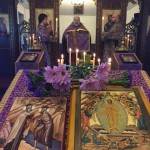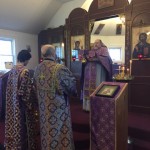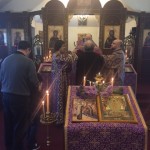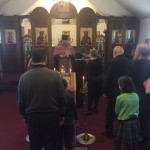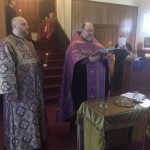On April 2, on the Fifth Sunday of Lent our parish family gathered for a liturgical celebration on our temple. Rector of St. George Church, Archpriest Igor Tarasov served the Divine Liturgy. Following the Gospel lesson he preached the following homily in English:
“Today we came to the celebration of the Fifth Sunday of Lent which makes us realize certain new things as we spiritually journey towards the Kingdom of Heaven. The Gospel lesson read today is telling us that the usual human and social rules may not apply in the God’s Kingdom. The Lord explains to His Disciples that if “whoever desires to become great among you shall be your servant. And whoever of you desires to be first shall be slave of all” (Mk. 10, 43-44). Today we also honor Ven. Mother Mary of Egypt whose life is a great example of how our earthly judgments can be wrong and an example of how a person can change if he or she is being helped by the divine grace.”
“The Gospel lesson shows us that Holy Apostles were living by earthly attitudes. Since they believed that their Teacher is the Messiah, they hoped that He will achieve a great power. Therefore, they asked Jesus to reserve for them the most influential positions in His Kingdom. They wished to be set at His right and at His left hand in His glory (Mk. 10, 37). It was a typical human desire to advance, to gain the best from a leader to whom one is faithful and loyal. Jesus Himself told the Disciples that there are different positions in the Kingdom of Heaven. But the Lord had to explain to them that our ideas about the Kingdom of Heaven are not accurate. Even among His followers on earth He wishes that they behave differently than the usual worldly communities. In such communities the rulers lord over their subjects and the great ones show their importance and their power over the others. “Yet it shall be not so among you”, says the Lord (Mk. 10, 43).”
“Dear brothers and sisters! These words of Christ teach us that the Kingdom of God is different from our world. Therefore, if we desire to reach that Kingdom, we need to abandon our earthly attitudes and human ambitions. And if we wish to become more important among others, or having certain authority among men, we need to learn to serve. The Lord does not condemn leadership or the authority among His followers. But He warns us that if we wish to become someone having such a call, we need to serve those who are entrusted to our care. Jesus reminds us that He Himself did not come to the world “to be served, but to serve, and to give His life a ransom for many” (Mk. 10, 45). And we know that He proved it by His passions and sufferings, by His death on the cross.”
“And the life of Ven. Mary whom we honor today teaches us certain things. Perhaps the first lesson we can learn from it is that we should never judge, never pre-judge. Who will be saved, who will be greater or lesser in the Kingdom of God? It is impossible to answer these questions. The Lord told the Apostles: “To sit on My right hand and on My left is not Mine to give, but it is for those for whom it is prepared” (Mk. 10, 40). We cannot answer these questions because it is never too late to change, to repent. We are all sinners and we may say that salvation is unlikely for us. Some of us are greater sinners and some of us are lesser sinners. We may think that great sinners are not going to be saved. But it is not true. Humanly speaking, when we consider the life of Mary until her 29th year, we might think that salvation had become impossible for her. She was a very sinful woman; she was a harlot, and she enjoyed it. And yet the service to her calls her “the greatest of saints”. Why? Because she did change; she changed completely. Humanly speaking, because of our sins, we are condemned; but by the grace of God everything, including the height of repentance, is possible.”
“The life of Ven. Mary of Egypt also teaches us that we need to accomplish our salvation along with the Holy Church. Ven. Mary retreated from the world, from human society, she lived in the desert, she accomplished all her endeavors of holiness alone. She was not in a monastery or in some parish. She was completely by herself in the desert. Yet she began her endeavors by receiving the Holy Sacraments of Penance and Communion, and she finished her life by confession and Holy Communion. She could not become a Saint without the Church. There is no salvation outside of the Church; and there is no perfect Christian life without the Sacraments.”
“Beginning the last week of Lent, let us come to an understanding that we are willing to approach a Heavenly, not earthly, Kingdom where everything will be different. Thus we should be prepared for that. And the life of Ven. Mary of Egypt is supposed to teach us how to prepare for everlasting blessedness of Paradise. We have to repent, constantly attempt to change our life and to be comforted by the Holy Sacraments of the Church. In this way we will be able to enter into the glory of Christ and to deserve our prepared seats in his Kingdom!”
The choir prayerfully performed penitent hymns during the preparation for Holy Communion.
Following the dismissal of the Liturgy the Rector preached a short sermon in Russian stressing the main ideas of his English homily.
After the Divine Liturgy the Rector performed the Sacrament of the Anointing of the sick. All persons who desired to receive that Mystery participated in the service and were anointed with the blessed oil.

